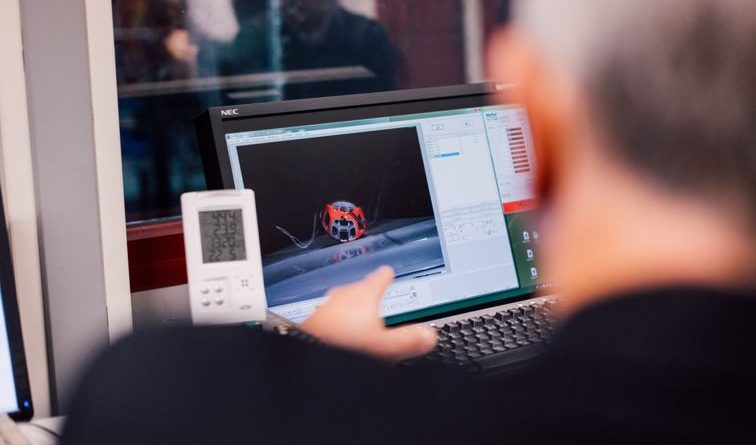POC & Volvo develop world-first car-bike helmet crash test
 Swedish sports and safety brand POC is teaming up with Volvo Cars for a series of world-first crash tests of bike helmets against cars.
Swedish sports and safety brand POC is teaming up with Volvo Cars for a series of world-first crash tests of bike helmets against cars.
The project consists of a number of specially-designed crash tests at Volvo’s safety research facilities in Gothenburg Sweden, and is part of a wider research project to understand the types of long-term injuries sustained by cyclists.
During the tests, POC bike helmets are worn by crash dummy heads mounted on a testing rig which are then launched towards different areas of the hood of a static Volvo car at different speeds and angles for various measurements.
The tests are based on existing regulatory test procedures for pedestrian head protection, allowing Volvo and POC to make a direct comparison between wearing a helmet and not.
The Volvo-POC project aims to ‘refine and advance’ current ‘rudimentary’ bike helmet testing, which involves the dropping of helmets from various heights on either a flat or angled surface.
The project’s findings will help POC to make its helmets safe and more protecting in the event of a car-bike accident, while providing insights for Volvo into these types of accidents for future development.
Malin Ekholm, head of the Volvo Cars safety centre, said: “This project with POC is a good example of our pioneering spirit in safety. We often develop new testing methods for challenging traffic scenarios. Our aim is not only to meet legal requirements or pass ratings tests. Instead we go beyond ratings, using real traffic situations to develop technology that further improves safety.”
POC has over 60 international awards for safety, innovation and design to its name and built a reputation for challenging conventional wisdom.
Head of Product Development at POC, Oscar Huss, said: “Much like Volvo Cars, safety is at the very centre of our mission and drives all our ideas and innovations. By working closely with scientific leaders in the POC lab we strive to lead the way in introducing new safety ideas.
“Certification standards are essential, but they should never limit our willingness to look beyond their parameters to find better and more innovative ways to reduce the consequences of accidents.”
In an earlier collaboration, the two companies worked on a pilot to connect bike helmets with cars in a bid to help avoid accidents.



